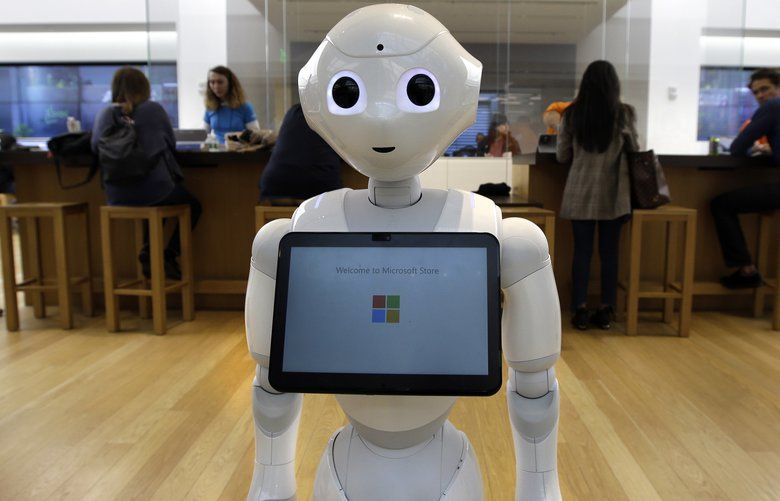A couple of months ago, Justin Adsuara was surprised to see a waist-height robot scooting through the hallways of the Embassy Suites by Hilton. The glowing white cylinder was accompanied by an operator teaching it the layout of the new Seattle hotel, similar to training a dog to walk on a leash. Once the robot learns the lay of the land, it could deliver room-service meals or linens to guests.
The Pioneer Square hotel is the only property where the chain is considering using the robot, according to Hilton. But Adsuara, a lobby attendant at the hotel, said even this test phase has stoked “real fear” in the hotel’s food and beverage department, where workers are concerned about job security.
From automated check-in to droids that carry bags to rooms, new technology is transforming the hospitality industry worldwide. As a result, hotel workers around the nation are seeking a say in the introduction of devices that could threaten their jobs.
Embassy Suites employees, represented by UNITE HERE Local 8, are negotiating to include in their first contract with Hilton the right to collectively bargain over the implementation of new technology. Last year, unionized Marriott workers in eight U.S. cities launched the largest hotel strike in U.S. history, one that lasted nine weeks and ended with an agreement, finalized in December, that gives workers some say in the implementation of technology. Last October, Westin Seattle hotel employees represented by UNITE HERE Local 8 reached a tentative deal with Marriott International.
“The biggest tools that we have are to organize and to push for things in our contract that can indirectly mitigate the impacts of technology,” said Adsuara, a member of the union.
From Hilton’s perspective, AI technology is a tool that can help staff enhance the customer experience, said company spokesman Nigel Glennie. He called the robot “something that would support team members.” He added that at this point, “This is a trial by one hotel,” and not something the chain is considering for its other properties.
The contract negotiations between Hilton and the Seattle workers follow months of bargaining between casino companies and members of the culinary and bartender unions in Nevada, which are affiliates of UNITE HERE. Language in the Nevada contracts that addresses technology was used as a model for negotiations between Marriott International and hotel workers across North America, said UNITE HERE Local 8 president Erik Van Rossum.
“We decided two years ago that if we didn’t push this in negotiations … that we would just be reactive and that there would be no negotiation,” said UNITE HERE president D. Taylor.
Although the hospitality union was in new territory, workers in other industries have long fought for job security in the face of automation. In 1960, the International Longshore and Warehouse Union negotiated a “mechanization and modernization agreement” to ensure job security and generous compensation for workers displaced by the increasing mechanization of the ports.
Using the longshoremen’s approach as a model, UNITE HERE created contract language that addressed the wide-reaching use of automation in hotels, including robots, tablets, automation, computers and software, that affects the workload and roles of employees. The union formed the hotel industry’s first technology committee with nine of its U.S. chapters, including Local 8.
The contract requires Marriott hotels to give the committee at least 30 days’ notice before changing or expanding any technology that was in use prior to the agreement, and 165 days before introducing new technology. The committee also has the right to bargain with the hotels over the use of the technology.
Workers displaced by automation will also be given preference for other openings at the hotel before a new worker is hired. The contract also specifies the employer must help pay for tuition if an employee has to attend school for training.
The union’s technology committee plans to hold its first meeting next month, said Taylor.
Westin Seattle bellhop Andy Huang said some technology introduced over the past year has brought confusion, not efficiency. For instance, if a guest asks for body wash and shampoo with the chain’s app, guest-service software will assign two people to fulfill the request.
“It’s a nightmare for us right now,” Huang said about the app. “It has a lot of bugs.” Some of his coworkers still don’t know how to use the app, he said.
Outside of Seattle, Marriott International has implemented a robotic butler called Botlr, as well as a chatbot at Aloft Hotels, both of which have alarmed Huang. Marriott International didn’t respond to repeated requests for comment.
If the lack of notice prior to the rollout of the guest-service app last year is any indication, Huang fears, “one day they’ll send out the robots” and cut his hours. Huang depends on his job to help his family of six and is unsure what he would do if he’s displaced.
Despite the contract requirement that Marriott negotiate with the union before implementing new technology, Huang said that his coworkers are still concerned. “The company, whatever they do, they don’t really care about the worker and the union,” Huang said. “I don’t really trust the company.”
At the Westin Seattle, the digital check-in process is the most recent technological advancement that has hotel workers fretting. Currently, guests are assigned a room by hotel staff, but visitors could soon check in with a mobile app that would allow them to bypass the front desk and go straight to their rooms.
UNITE HERE Local 8 representatives will soon enter the bargaining phase on the digital check-in process, Van Rossum said.
Although the Westin Seattle is not experimenting with room-service machines, Van Rossum predicts that it’s only a matter of time before automated devices become more commonplace.
“This whole generation of room-service robots is likely to be an incentive for hotels not to pay an hourly employee, but to employ a robot,” Van Rossum said. “A hotel can rent a robot for much less than the cost of paying an employee health care and wages.”
Amazon’s voice-activated software, Alexa, can also be found in hotels throughout Seattle. Last summer, independent hotel Motif installed Alexa in all 319 guestrooms — the largest hotel deployment of the devices in the world, according to Motif Seattle marketing manager Lauren Levasseur. Guests can ask Alexa for room service, the Wi-Fi password or the hotel gym’s hours, and recommendations for local bars, restaurants or music venues.
Levasseur said Alexa hasn’t displaced any workers, and the hotel does not anticipate replacing any employees with AI. She also said employees were included in the conversations about the technology. “This use of AI is only enhancing the guest experience by making it easier for our staff to better serve guests’ needs,” Levasseur said.
Dave Berger, founder and CEO of Volara, the New York-based company that customizes voice-activated software for hotels, said 30% of requests at hotels Volara services are made with the Alexa devices. “At least for me, what differentiates a hotel stay are the human smiles, warm welcomes, and thoughtful gestures from the humans I encounter at the property. Great technology enables hospitality professionals to do what they do best — be great hosts.”
It’s unclear whether new technology will help hotel workers better serve and entertain guests. In the meantime, UNITE HERE’s Taylor suggests that hospitality management do some soul-searching. “I think that the industry has to decide whether they’re going to be a hospitality industry where they actually interact, or if it’s going to be like the airlines where there’s very little service and if [guests] get a bag of peanuts then they’re happy.”


The opinions expressed in reader comments are those of the author only and do not reflect the opinions of The Seattle Times.